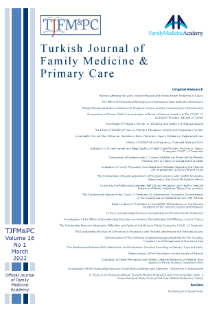The Relationship Between Adherence to Medication and Quality of Life and Health Perception in Hypertensive Patients
___
1. Mills KT, Stefanescu A, He J. The global epidemiology of hypertension. Nat Rev Nephrol. 2020 Apr;16(4):223-37.2.WHO | Global status report on noncommunicable diseases 2014 [Internet]. WHO. World Health Organization; [a.yer 13 Nisan 2020]. Erişim adresi: http://www.who.int/nmh/publications/ncd-status-report-2014/en/
3. Sengul S, Akpolat T, Erdem Y, Derici U, Arici M, Sindel S, vd. Changes in hypertension prevalence, awareness, treatment, and control rates in Turkey from 2003 to 2012. J Hypertens. 2016;34(6):1208-17.
4. Arici M, Turgan C, Altun B, Sindel S, Erbay B, Derici U, vd. Hypertension incidence in Turkey (HinT): a population-based study. J Hypertens. 2010;28(2):240-4.
5. Cramer J. Cramer J. Medicine partnerships. Heart. 2003 May;89(suppl 2):ii19-21.
6.Saleem F, Hassali MA, Shafie AA, Awad GA, Atif M, ul Haq N, vd. Does treatment adherence correlates with health related quality of life? Findings from a cross sectional study. BMC Public Health. 2012 Apr;12:318.
7. Önal AE, Erbil S, Gürtekin B, Ayvaz Ö, Özel S, Cevizci S, Güngör G. İki ilköğretim okulunda öğrencilerin kendi sağlıklarını algılama düzeyi ve bildikleri sağlık sorunları”. Nobel Medicus, 2009;5(2): 24-48.
8. Al-Noumani H, Wu JR, Barksdale D, Alkhasawneh E, Knafl G, Sherwood G. Relationship between medication adherence and health beliefs among patients with hypertension in Oman: Pilot study. Sultan Qaboos University Medical Journal. 2017 Aug;17(3):e329.
9.Yue Z, Bin W, Weilin Q, Aifang Y. Effect of medication adherence on blood pressure control and risk factors for antihypertensive medication adherence. J Eval Clin Pract. 2015 Feb;21(1):166-72.
10. ESC/ESH Arterial Hypertension (Management of) Guidelines 2018 [Internet]. [a.yer 14 Nisan 2020]. Erişim adresi: https://www.escardio.org/Guidelines/Clinical-Practice-Guidelines/Arterial-Hypertension-Management-of,
11. Morisky DE, Green LW, Levine DM. Concurrent and predictive validity of a self-reported measure of medication adherence Medical care. 1986:67-74.
12. Demirezen E. Türkiye’de ve Almanya’da yaşayan antihipertansif ilaç kullanan Türklerde ilaç tedavisine uyum. İstanbul Üniversitesi Sağlık Bilimleri Enstitüsü, Hemşirelik Programı Doktora Tezi, İstanbul, 2006: 30-31.
13. Kadıoğlu H, Yıldız A. Sağlık Algısı Ölçeği’nin Türkçe çevriminingeçerlilik ve güvenilirliği. Turkiye Klinikleri Journal of Medical Sciences. 2012;32(1):47-53.
14. Kilic C. General health questionnaire: Reliability and validity study. Turkish Journal of Psychiatry. 1996;7(1):3-9.
15. Kilic C, Rezaki M, Rezaki B, etal. General health questionnaire (GHQ12 & GHQ28): Psychometric properties and factor structure of the scales in a Turkish primary care sample. Social Psychiatry and Psychiatric Epidemiology. 1997;32(6):327-331.
16. Anadol Z, Dı̇şcı̇gı̇l G. Hipertansif hastalarda tedavi uyumunu etkileyen faktörler. Turkiye Klinikleri J Cardiovasc Sci. 2009;21(2):184-90.
17. Mert H, Kuruoğlu E. Multidisipliner bir özel çalışma modülü araştırması: Hipertansiyon hastalarının tedaviye uyumlarının incelenmesi. Turkish Journal of Family Practice/Türkiye Aile Hekimligi Dergisi. 2011 Jan 1;15(1).
18. Al-Ramahi R. Adherence to medications and associated factors: A cross-sectional study among Palestinian hypertensive patients. J Epidemiol Glob Health. 2015 Jun;5(2):125-32.
19. Alhaddad IA, Hamoui O, Hammoudeh A, Mallat S. Treatment adherence and quality of life in patients on antihypertensive medications in a Middle Eastern population: adherence. Vasc Health Risk Manag. 2016;12:407-13.
20. Arslan DE, Akça NK. Kırsal alanda yaşayan hipertansiyon hastalarının ilaç tedavisine uyumları. Bozok Tıp Dergisi, 2019;10(1):55-62.
21. Zyoud SH, Al-Jabi SW, Sweileh WM, Wildali AH, Saleem HM, Aysa HA, vd. Health-related quality of life associated with treatment adherence in patients with hypertension: a cross-sectional study. Int J Cardiol. 2013 Oct;168(3):2981-3.
22. Shimamoto K, Ando K, Fujita T, Hasebe N, Higaki J, Horiuchi M, Imai Y, Imaizumi T, Ishimitsu T, Ito M, et al. Japanese society of hypertension committee for guidelines for the management of hypertension. The Japanese society of hypertension guidelines for the management of hypertension (JSH 2014). Hypertens Res. 2014;37:253–390. doi:10.1038/hr.2014.20.
23. Imai Y, Ohkubo T, Kikuya M, Hashimoto J. Practical aspect of monitoring hypertension based on self-measured blood pressure at home. Intern Med. 2004;43:771–78.
24. Cheng, Hao‐Min, et al. Asian management of hypertension: Current status, home blood pressure, and specific concerns in Taiwan. The Journal of Clinical Hypertension. 2020;22:511-514.
25. Waeber B. Treatment strategy to control blood pressure optimally in hypertensive patients. Blood Press. 2001;10(2):62-73.
26. Yiannakopoulou EC, Papadopulos JS, Cokkinos DV, Mountokalakis TD. Adherence to antihypertensive treatment: a critical factor for blood pressure control. Eur J Cardiovasc Prev Rehabil. 2005 Jun;12(3):243-9.
27. Park NH, Song MS, Shin SY, Jeong J-H, Lee HY. The effects of medication adherence and health literacy on health-related quality of life in older people with hypertension. Int J Older People Nurs. 2018;13(3):e12196.
28. Carballo E, Cadarso-Suárez C, Carrera I, Fraga J, de la Fuente J, Ocampo A, vd. Assessing relationships between health-related quality of life and adherence to antiretroviral therapy. Qual Life Res. 2004;13(3):587-99.
29. Takemura, Masaya, et al. Repeated instruction on inhalation technique improves adherence to the therapeutic regimen in asthma.Journal of Asthma. 2010 Mar;47(2):202-208.
30. Rajpura JR, Nayak R. Role of illness perceptions and medication beliefs on medication compliance of elderly hypertensive cohorts. J Pharm Pract. 2014;27(1):19-24.
31. Haddad C, Hallit S, Salhab M, Hajj A, Sarkis A, Ayoub EN, vd. Association Between Adherence to Statins, Illness Perception, Treatment Satisfaction, and Quality of Life among Lebanese patients. J Cardiovasc Pharmacol Ther. 2018;23(5):414-22.
- ISSN: 1307-2048
- Yayın Aralığı: 4
- Başlangıç: 2007
- Yayıncı: -
Diyabet Öz Yönetiminde Çok Disiplinli Ekip Yaklaşımı
Arzu YILDIRIM, Arif Bayram HACIHASANOĞLU, Nafiz BOZDEMİR, Rabia HACIHASANOĞLU AŞILAR
Hacer ALAN DİKMEN, Ilknur Munevver GONENC, Yasemin SANLİ
Böbrek Fonksiyonları Normal Olan Diyabetes Mellitus Hastalarında Anemi Sıklığı ve Bazı Nedenleri
Elif ÖZKAN, Hüseyin BALCIOĞLU, Uğur BİLGE, Pınar YILDIZ, İlhami ÜNLÜOĞLU
Turgay DEMİR, Kezban ASLAN KARA, Şebnem BIÇAKÇI, Mehmet Taylan PEKÖZ, Mehmet BALAL, Meltem DEMİRKIRAN, Hacer BOZDEMİR
Psychiatric Comorbidity and Psychosocial Impairments in Children with Dermatologic Disorders
Ayla UZUN ÇİÇEK, Seda Aybüke SARI, Rukiye Yasak GÜNER, Melih AKYOL, Berksoy Sibel HAYTA, Selim ÇAM
Demir Eksikliği Anemisi Tedavisi Alan Tip 2 Diabetes Mellituslu Hastalarda HbA1c Takibi
Tek Merkez Deneyimi: Unutulmaması Gereken Nadir Bir Demans Nedeni Olarak Creutzfeldt-Jakob Hastalığı
Turgay DEMİR, Kezban ASLAN, Mehmet Taylan PEKÖZ, Mehmet BALAL, Şebnem BIÇAKCI, Meltem DEMİRKIRAN, Hacer BOZDEMİR
Annelerin Bebek Bakımında Kullandıkları Geleneksel Uygulamaların Kuşaklararası Boyutu
Aylin PEKYİĞİT, Dilek YILDIZ, Berna EREN FİDANCI, Burcu ÇALIK BAĞRIYANIK, Özgenur DEHMEN, Tuğba KOÇAK, Sema ALTINTAŞ
